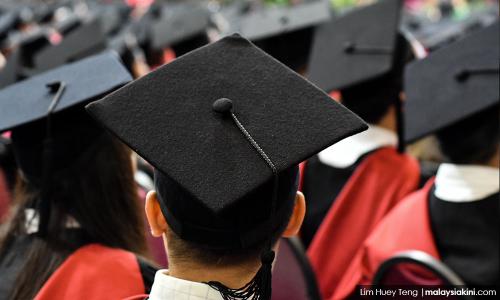LETTER | Rebooting our public universities to high standards a colossal task
LETTER | Two commentaries were written recently questioning the credibility and the quality of the top management and academic staff of local public universities. The issue is not new. It is a well-known fact that our higher education system is on a downward spiral.
In her article 'Are we proud of our universities?' (June 8), Prof Sharifah Munirah Alatas raised this pertinent question. Most academics of credible standing would readily respond in the negative. Others who are sitting pretty in their comfort zone of mediocrity would quickly deny this assertion. The preponderance of academics of this genre in our public universities would ensure that the question remains irrelevant and thus create the wrong impression that all is well in our higher education system.
The resistance towards the culture of academic excellence and meritocracy began as early as during the time when Professor Syed Hussein Alatas was appointed the vice-chancellor of the University of Malaya. In his effort to raise the standard of the university and to place it to be at par with other international universities, he practised - regardless of race - the culture of excellence and meritocracy. This policy did not go down well with academics who were capability-challenged, with an ethnic agenda and strong political backing. Through deviously well-crafted moves, they managed to remove Syed Hussein from his post.
The downward spiral of our higher education system began from this point onward.
I had the opportunity to interview Syed Hussein in the early 1990s when I was researching on the Bumiputra Malaysia Finance case for my PhD. I sought his views on the issue of political corruption in the country since his book on “The Sociology of Corruption” was a well-known book in the academic circle, both locally and abroad.
During the interview, as an academic who believes that his removal was a strategic move to prevent him from implementing policies that would continue to preserve and maintain his university’s standard of excellence, I could not help but broach into the topic of his unceremonious departure from the university. From the conversation, I gathered that even then there were already academics whom he termed as 'kangkung' and whose characters were no different from the corrupt and evil politicians.
On the suggestion by Kua Kia Soong in his article 'Vice-Chancellors and the elephant in the room', raising the point of appointing a non-Malay vice-chancellor, I would reserve my concurrence. There are many non-Malay academics who would not stand up for their rights and would readily resort to apple-polishing as the key to their career survival. These people know the rules of the game well. Under the current environment, and if the decision to appoint non-Malays to the top posts is made, these people would most likely be tipped to hold these posts. Their appointments would only be an exercise in tokenism and would not change anything except perhaps creating a façade of multi-racialism.
As in the case of Syed Hussein, who was a Muslim/Malay, the difficulty in bringing about change lies in the presence of resistance from among a large number of insecure and capability-challenged academics in the university. They are a formidable force, given that they are well-supported by politicians who share their agenda. Given this scenario, it is doubtful that a non-Malay vice-chancellor would make any difference.
Any sincere effort to reboot our higher education system would start with the appointment of credible academics with impeccable level of integrity to positions of leadership.
To gauge how deep the rot of our higher education system is, we must carry out a thorough on-the-ground audit on the performance of our academic staff and students. Students should be interviewed to gauge their level of knowledge in their chosen programmes. The quality of their essays and theses should be checked and be confirmed free from plagiarism. Even the quality of the examination questions and answers should be checked and evaluated.
As for the lecturers, their competency in their subjects or areas of specialisation must be audited, along with their level of competency in the skills required of an academic, such as their teaching ability, and their command of the required languages. These are the factors to look for in vetting candidates for lecturers' posts. Unfortunately, these factors have been taken for granted.
The issues mentioned above are really basic. But the neglect of these basic issues is the reason why the system is rotting. Instead of addressing them as a problem that urgently needs fixing, the authorities are more interested in creating a façade of excellence dressed in slogans, posters, congratulatory statements, and cherry-picked statistics.

In this regard, the Malaysian Qualification Agency will have to sincerely evaluate its roles, auditing procedures, and standards. It should not be obsessed with its own created rules and templates which it insists must be followed. The evaluation process should not be just perfunctory checking of files and forms, and later to be concluded with sumptuous lunch or tea at the chancellory!
Another issue that adversely affects the quality of our higher education is our obsession with quantity as opposed to quality. There are simply too many public universities in this country. Those who are not properly qualified were recruited as lecturers. These people were quick to learn that if you do not have what it takes to go to the top of your profession, play politics. In this country and under the current political environment, this strategy works very well. Through these people, we have large talent pools of potential deans and vice-chancellors!
As for the students, a similar situation prevails. Students who are not academically inclined were taken in to fill up the student intake quotas. The demand to ensure that they would pass and graduate on time would further add to the downward pressure to lower the standards.
The way forward for this country is to reduce the number of existing universities and transform some of these universities into vocational colleges or polytechnics. Make no mistake about it: students who do not perform well are not intellectually inferior. It is just that their interests are somewhere else. Their interest in the academic courses would be further eroded by them having to face lecturers whose professional competencies are not up to the mark and do not meet their expectations.
Rebooting our higher education system so that it can be brought up to international standards is indeed a colossal task. It is a task that would require the embodiment of the culture of excellence and integrity, strong political will power on the part of the government, right leadership at all levels, and more importantly for a start, acknowledging the need to separate the chaff from the grain – the weeding out of 'kangkung' academics from our universities.
TEH YIK KOON is an academic at a local university.
The views expressed here are those of the author/contributor and do not necessarily represent the views of Malaysiakini.
RM12.50 / month
- Unlimited access to award-winning journalism
- Comment and share your opinions on all our articles
- Gift interesting stories to your friends
- Tax deductable
